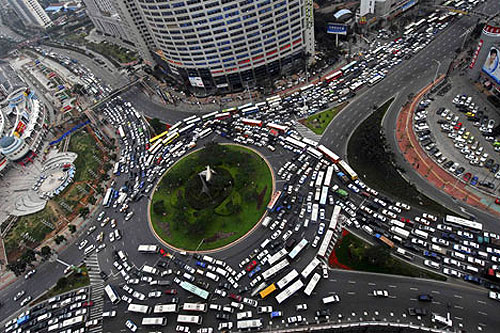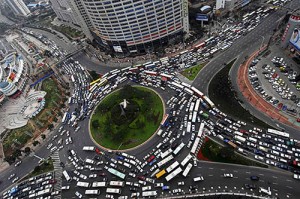Intersections and Justice – by Courtney Hoekstra
I’ve often wondered what my life would be like in a world without social injustice. So much of my time and energy is spent on the work of challenging systems and situations where people are being treated unfairly, pushed aside or ignored. The vocation to work for social justice is an all-consuming call—there is no end to the work needed in this world. It easily becomes an overwhelming task, one that has the potential to cause justice-seeking people to (consciously or not so consciously) choose a corner of the universe to work on and put their backs to the rest. After all, human energy is an all too exhaustible resource, and if I am going to make any kind of dent in [insert “ism” or “phobia” here], I need to put my whole being into this particular struggle.
There is certainly a necessity for directed passion and the conservation of energy in justice work, and generally individuals feel more deeply connected to some issues than others. While God’s call to do justice is not narrowed to one issue, experiencing injustice personally because of our financial status, physical ability, gender, race or sexual attraction, or watching someone we love experience these or other types of injustice can have the effect of moving us to action. These experiences are a natural motivator, because having had them means we know injustice on the soul level.
My own motivating experiences came in staggered spurts across the course of my young adulthood and continue on to this day. As a white woman who grew up in a conservative and racially homogeneous Christian community, I was certainly a child of privilege in most ways. Within that community, however, my identity as a woman marked the end of that privilege, though I didn’t truly understand that until much later. Growing up, I would say I had a pretty intense case of “colorblind racism,” where I conveniently rested in my privilege and ignorance of history believing that race shouldn’t matter. I was “against” homosexuality and for “hating the sin and loving the sinner.” I believed anyone who was not a Christian was unfortunately, but clearly, going to hell. My social location, identity and experience converged at the intersection of multiple levels of privilege within my U.S. context: white, Christian, educated, straight (rather, closeted), and solidly middle-class.
I would hope that those who meet me today would find the preceding paragraph at least a little surprising, given the growing I hope I’ve done. While I still live and move in a place of extreme unearned privilege, I hope that I am far more aware of that privilege and consistently working to challenge and relinquish it. I also now find myself keenly aware of the aspects of my personal identity that are a challenge to what society has determined the norm and that affect my interactions with the world daily—my identity as a Queer woman in particular. The growing I’ve done (and continue to do) and the ways in which I’ve come to be passionate about social justice did not come easy. The initial soul-level motivating experiences in my life came through the pain of being a woman at a male-dominated and misogynist seminary, through having a real friend whose skin color is different than mine begin showing me what racism and white privilege are and how I participate in both, and through coming out as Queer within a (more progressive than that of my childhood, but still homophobic) Christian context.
These three awakenings came in rapid succession for me, so there is a sense in which my motivation to work for social justice has always been shaped by intersecting issues. I quickly became profoundly aware that my own identity falls at the intersection of various levels of privilege as well as marginalization, which has helped me to understand the same is true for others. I certainly admit that these three areas of justice work – for women, people of color and LGBTQ people – are where I find my deepest passion. Still, I am keenly aware that these three intersect not only with each other, but with a multitude of other justice issues. It is essential to work to understand how social location/identity intersections shape human experience. I’ve come to firmly believe that to attempt to do any kind of justice work at the expense of another is to do injustice.
The stories that Cynthia tells unfortunately sound very familiar to me. I currently serve as the Associate for Advocacy Committee Support in the Presbyterian Church (USA), where I work with the two advocacy committees of the denomination: one focused on racial justice and advocacy and the other focused on gender justice and advocacy. Very early on in my job, I remember struggling with the lines we draw between “types” of justice/advocacy. I’ll never forget sitting at a table with a white woman who cares deeply about gender justice and having her tell me that I was steering us off of our main agenda—that there was another committee to deal with racism and other networks to work for LGBTQ fairness. How she could say this while looking into the eyes of a woman who is Queer and at a table with two women who are black, I don’t know. To tell a woman of color that her experiences of racism are not also integral to her experiences as a woman is to negate her identity and to declare white women’s experiences as the normative experience of being a woman. The same goes for Queer women: to say experiences of homophobia and heterosexism aren’t part of our experiences as women delegitimizes our identity as women and sets the heterosexual woman’s experience as the standard.
When I get into dissecting interactions like the one above, I can hear the voices of many people with whom I’ve worked warning me. One of my most common experiences of well-intentioned people intentionally choosing to leave intersectional complexities of justice behind is in their consideration of strategy in advancing their cause. I’ve been told that to bring LGBTQ issues into the conversation about justice for immigrants (some of whom happen to be part of the LGBTQ community) would mean that many of those working for just immigration would no longer work with us. On the flip side, I’ve heard, “We’re the only ones working on LGBTQ issues. If we start talking about racism, we’ll lose our focus.” Never mind if you’re a gay man who is also Latino.
Human identities are complex, and when an aspect or multiple aspects of your identity are marginalized, you are keenly aware of this. For those of us who have experienced injustice because of who we are, we know that the “issues” we deal with in advocacy and justice work are typically directly attached to actual human beings whose identities can’t realistically be parsed out into gender, race, sexual orientation, etc. It is only a voice of privilege that can say that justice issues don’t overlap, because the “issues” which are attached to my personal being intersect and together inform my experiences.
One example that clearly portrays the need for an intersectional approach to justice is the work for universal access to healthcare. As a woman, I’m keenly aware of the fact that women are often those without insurance, as they are most likely to be unemployed or underemployed because of the sexism still inherent in employment practices. The same is also true for people of color, so this is also an issue intersecting with racism (which intersects with sexism for women of color). As a woman with a decent amount of privilege, I have very good healthcare; however, since my partner is a woman, she is not covered. Thus, lack of access also intersects with heterosexism. Clearly, this is just a surface glance at the intersections involved in this issue, but I think it makes the point.
I freely admit that an intersectional approach to justice is in many cases not the most strategic, at least when strategy is about quick advances of a particular aspect of justice. It makes our work more complex and requires more energy. I still believe it is appropriate and necessary to focus our energy and efforts where possible, but always remaining conscious of the intersections where that focus may need to expand is essential. We can still do intense work against racism, but it is crucial to recognize, for example, the nuances that gender, class, or sexual orientation bring to the discussion. The reality is that human identities and the effects of social location are complex, and we experience privilege or injustice or a combination thereof as a result of that complexity. An intersectional approach to justice work is the only way that the full humanity of individuals is truly honored and the only way in which we can hope to accomplish comprehensive and inclusive justice.



Well done! As a woman of color, it always feels as if a small victory is won when anyone of privilege “gets it”.